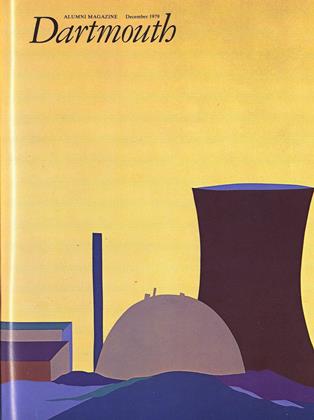Carl F. Long, dean of the Thayer School, pointed out during a recent conversation that one of the reasons for the decline in United States technological leadership is "an unimaginative and narrow-based engineering education." Partly in response to the national need for more innovative engineers, and in keeping with Thayer's philosophy of educating both academically oriented engineering scientists .and professionally bound practicing engineers, the school established INVENTE, a center for engineering design. Now well into its second year, the center is the direct beneficiary of the $1-million Cook gift. John Collier '72, who earned his doctorate at Thayer in 1976, is director of the center, which combines engineering education - particularly courses in design - with a "clinic" that provides contracted professional services to industry.
If an academic center for technological innovation is going to succeed and have any practical value, Long said, it needs the help of industry to provide advice, research projects, and money. For that reason, INVENTE's advisory board, in addition to three members from Thayer, has representatives from six founding companies. Each company has guaranteed, over a five-year period, $30,000 in contracted research and development work, plus $20,000 in free funding. In its first year, the center involved 25 students and 13 Thayer professors, and spent more than $200,000 of industrial funds on research for 29 companies. The design projects ranged from artificial knee and hip joint replacements, to electronic components, to low-profile railroad cars for hauling trailer vans through low tunnels. Students are able to apply project work toward thesis requirements, and in the process learn about cost-accounting, patenting, licensing, and marketing. And there is always the chance that participants will find a market for a patentable invention.
In addition to developing a closer relationship between Thayer and industry, and besides providing students with opportunities to do the kind of work that will be demanded of them as professional engineers, Long said he hopes the center will "convert" some of the faculty to careers more oriented to professional activity. This will take some doing, he admitted, because academic advancement has tended to depend on peer evaluation of specialized research, grants obtained, and publications in respected journals. The activities of professionally oriented faculty members, in contrast, tend to be more eclectic, responding to industrial needs. Instead of submitting research articles to prestigious journals, they write reports to industry about research and development work. One of the goals of the INVENTE center, Long added, is to create an educational environment in which "involvement in the practice of engineering is regarded as an intellectual and creative activity of the highest level - a status too often reserved solely for applied and pure science."
 View Full Issue
View Full Issue
More From This Issue
-
 Feature
FeatureAn extremely small malfunction ... and then something terrible happened
December 1979 By John G. Kemeny -
 Feature
FeatureThe Medical Legacy of August 1945
December 1979 By Stuart C. Finch -
 Feature
FeatureGiving and Getting
December 1979 By Mary Ross -
 Article
ArticleAn Old-fashioned Mutant
December 1979 By MICHAEL COLACCHIO '80 -
 Books
BooksThe Country Remembers
December 1979 By R.H.R. -
 Article
ArticleThe Five-Year Plan
December 1979 By MICHAEL COLACCHIO '80








